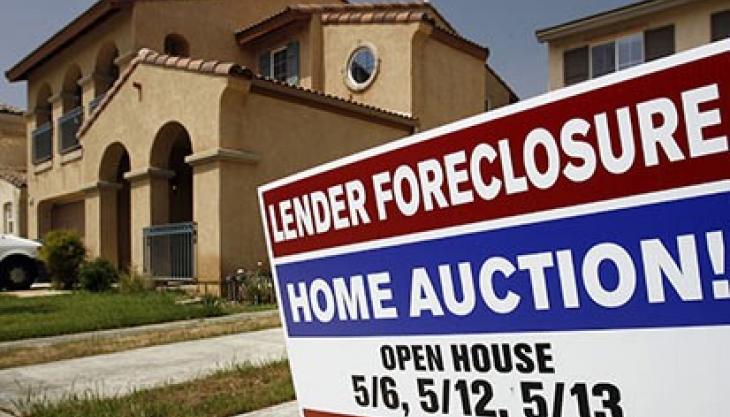Don’t Delay: North Carolina Foreclosures Move Quickly
Submitted by Rachel R on Tue, 07/16/2013 - 8:16pm

Image Source: blackenterprise.com
Losing your home is never an easy pill to swallow. You naturally want to do whatever you can in order to save your house, but if you can’t work out anything with the lender that will allow you to stay, you may be facing a foreclosure. While the foreclosure process can seem confusing, you should be aware that the process is different in every state. In some states, people may have up to six months or longer to move out of their home after a foreclosure. Things are quite a bit different here in North Carolina, as you may only have six to seven weeks until the sale of your home if finalized. Although the idea of losing your home to foreclosure is stressful enough, when you add in the fact that you have such a short amount of time to find somewhere else to live, the entire process can be completely overwhelming.
In North Carolina, after receiving a notice of foreclosure, you will have a hearing where a magistrate reviews whether or not the mortgage company can foreclose on your home. There are only a few things that the lender will need to prove in order to get an okay to proceed with the foreclosure. In a nutshell, if you are behind on payments and the lender can prove it, the foreclosure can legally move forward.
Once the mortgage company has gotten approval and the foreclosure is imminent, the sale of your home is held approximately three weeks later. The sale is then finalized ten days from that point, unless there are additional bids that trump the previous winning bid. In that case, there will be an additional ten days given for any new (higher) bids to come in. This type of bidding war usually happens when the original winning bid was far below the market value of your home.
When the sale is final and the winning bid is in, you must vacate your home. Some people go on their own, not willing to be subjected to the eviction process. Others simply have nowhere else to go and decide to stay until they are forced out. If it comes down to an eviction to get you out of the home, you may be able to stay a couple more weeks. While there are some other things you can try during this time to extend your stay, for the most part, you should likely make plans to find a new place to live.
Image Source: peopleofcolororganize.com
When you know you’re facing a foreclosure in North Carolina, one of the most important things you can do is to educate yourself on how bankruptcy can stop the process. After all, it may be the only way to avoid losing the roof over your family’s head.
Bankruptcy to the Rescue
The moment you file for bankruptcy in North Carolina, there will be an automatic stay issued to your creditors. That stay includes your mortgage company. Whether you decide to file for Chapter 7 or Chapter 13 bankruptcy, this is how bankruptcy laws can stop a NC foreclosure…at least temporarily. You will legally be able to stay in your home while the bankruptcy proceedings are being carried out.
How Chapter 7 Helps a Foreclosure
A Chapter 7 bankruptcy is filed when you want to discharge all of your unsecured debt. The way Chapter 7 can stop a North Carolina foreclosure is that it gives you time to set up a new type of payment agreement with your creditor by showing that you’ll be able to afford mortgage payments after your other debts are discharged in the bankruptcy process.
How Chapter 13 Helps a Foreclosure
If you’d like to keep your home, you may want to consider filing a Chapter 13 bankruptcy. In this type of bankruptcy, you are able to restructure your mortgage payments or at least set up a system that will allow you to pay off the past due amount. If you choose to restructure, you’ll still be making regular payments per your original agreement with the mortgage company. You’ll also need to make enough income to actually be able to make these kinds of payments and still satisfy your other debts.
Image Source: realtybiznews.com
More Information
In North Carolina, although the foreclosure process moves quickly, it is possible to stop it and catch up on overdue payments using a Chapter 13 bankruptcy. You can also stop a foreclosure and sell a property that has equity by filing either a Chapter 13 or Chapter 7 bankruptcy. In order to find out if filing for bankruptcy will help stop the foreclosure on your home, you must speak to an experienced North Carolina bankruptcy attorney and discuss your particular financial situation.
Dedicated to helping residents of North Carolina find the best solutions to their debt problems. Don’t waste another day worrying about your debt. Call +1-833-627-0115 today to schedule a free initial consultation to discuss your bankruptcy options.
Debts Hurt! Got debt? Need help? Get started below!
Serving All of North Carolina
- Bankruptcy Attorneys Raleigh NC (North)
- Bankruptcy Attorney Fayetteville NC
- Bankruptcy Attorney Durham NC
- Bankruptcy Attorneys Wilson NC
- Bankruptcy Attorneys Greensboro NC
- Bankruptcy Attorneys Southport NC
- Bankruptcy Attorneys Wilmington NC
Bankruptcy Attorneys Raleigh NC (North)
6616 Six Forks Rd #203 Raleigh, NC 27615 North Carolina
Tel: (919) 847-9750

Bankruptcy Attorney Fayetteville NC
2711 Breezewood Ave Fayetteville, NC 28303 North Carolina
Tel: (910) 323-2972

Bankruptcy Attorney Durham NC
1738 Hillandale Rd Suite D Durham, NC 27705 North Carolina
Tel: (919) 286-1695


Bankruptcy Attorneys Greensboro NC
2100 W Cornwallis Dr. STE O Greensboro, NC 27408 North Carolina
Tel: (336) 542-5993

Bankruptcy Attorneys Southport NC
116 N Howe St. Suite A Southport, NC 28461 North Carolina
Tel: (910) 218-8682

Bankruptcy Attorneys Wilmington NC
116 N. Howe Street, Suite A Southport, NC 28461 North Carolina
Tel: (910) 447-2987
